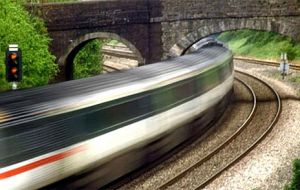MercoPress. South Atlantic News Agency
High-speed railway project to link Scotland with London
 The proposed network would take passengers from Glasgow to London in just two hours and 16 minutes
The proposed network would take passengers from Glasgow to London in just two hours and 16 minutes Britain’s Network Rail has proposed a new £34 billion high-speed railway line linking Scotland and London by 2030. The line would serve Birmingham and Manchester, getting passengers from Glasgow to London in just two hours and 16 minutes, the rail firm said. It rejected several alternative routes, including the east of England.
The UK government said assessments of the costs and environmental issues involved needed to be carried out before it could approve any plans.
It is currently conducting its own rail network review and said it hoped to be in a position to make a decision next year.
If given the go-ahead, Network Rail said it would take up to five years to decide on the exact route and complete the planning stages. It wants the first section of the line between London and Birmingham to be completed by 2020.
The line would become Britain’s second high-speed rail link after the line that runs from London St Pancras to the Channel Tunnel, run by the Eurostar service and connecting to high-speed lines in continental Europe.
Network Rail's proposed new line linking Glasgow and Edinburgh with London, on which trains could travel as fast as 200mph, would also serve Manchester, Liverpool, Preston and Birmingham.
A spokesman for one of Manchester's biggest employers, Kellog's cereals, said: “This is great news for business in Manchester, just as London is going to be more accessible for us, Manchester will be for those in the South East.”
The new line would cut the journey between London and Birmingham to 45 minutes, from a best time of one hour and 22 minutes currently.
Rail passengers would also be able to get to Liverpool in one hour and 23 minutes, from two hours and eight minutes now.
Network Rail, the company that runs Britain's rail infrastructure, said the new line would require more than 1,500 miles of rail, sleepers and ballast, as well as 138 bridges over roads and current railway lines.
Network Rail says the new line is required to ease the pressure on Britain's railways. It says passenger numbers have rocketed by 40% over the past decade, and that by 2024, many existing lines will be at full capacity.
Transport Secretary Lord Adonis told the BBC that high-speed links were vital for the future. “This report makes a powerful case for high-speed rail in Britain,” he said.
Lord Adonis said the company set up by the government to prepare a high-speed rail plan would take “full account” of the proposals and deliver a report by the end of the year, with a decision by next year.
Currently, the route proposal will be between London and the West Midlands, with options to extend the line to Scotland and the north of England.
The Conservatives' shadow transport secretary, Theresa Villiers, told the BBC she welcomed the announcement. “We're committed to taking high-speed rail to the north of England, and we think Labour should match that,” she said.
The Conservatives currently propose to build a rail link between Leeds and London.
Network Rail said it had rejected routes that would have taken the new line via Leeds and Newcastle upon Tyne, as well as a route that included Leicester and Sheffield and another option through Bristol and Cardiff.
But Greg Mulholland, MP for Leeds North West said: “Once again this government has neglected the people of Yorkshire when it comes to investment in transport.”
Meanwhile, the Freight Transport Association said that the announcement offered a chance to look at wider rail issues beyond passenger transport.
“While it is good news that Network Rail has set out its agenda for High Speed 2, far reaching and meaningful improvements to rail freight could be made for just a fraction of the £30bn estimated [cost],” said the organisation's Christopher Snelling.
Network Rail based its decision on a 12-month study involving 20,000 hours of work and more than 1,500 pages of analysis.
The firm said that the line would account for 43.7 million journeys per year by 2030, which would result in 3.8 million fewer vehicle journeys and fewer carbon dioxide emissions.
“If, as research suggests, up to three times as many passengers will be travelling on our railways by 2020, then it is important that we move quickly in planning today for the rail network of tomorrow,” said Scotland's Transport Minister Stewart Stevenson.




Top Comments
Disclaimer & comment rulesCommenting for this story is now closed.
If you have a Facebook account, become a fan and comment on our Facebook Page!